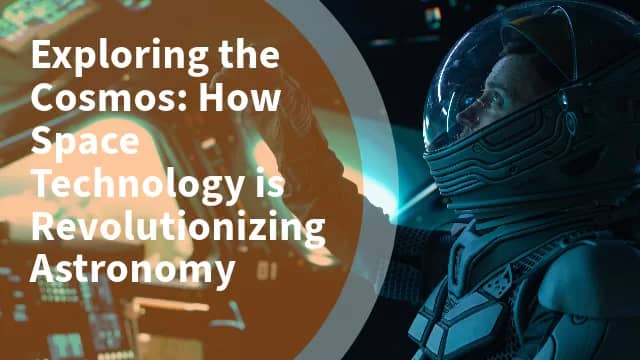In the vast expanse of the universe, the study of astronomy has always captured the human imagination. As we gaze upon the stars and galaxies, the mysteries of the cosmos beckon us to explore further. Thanks to remarkable advancements in space technology, our ability to understand and unravel the enigmas of the universe has taken a quantum leap. In this article, we delve into the fascinating realm of astronomy and how space technology is revolutionizing our understanding of the cosmos.
Exploring the Cosmos: How Space Technology is Revolutionizing Astronomy
Space technology, once limited to launching satellites and astronauts, has now become a crucial tool for astronomers to explore the farthest reaches of space. With the integration of cutting-edge technologies, astronomers are uncovering unprecedented insights that were once deemed impossible.
The Role of Space Telescopes in Observations
One of the most iconic contributions of space technology to astronomy is the development of space telescopes. These remarkable instruments, positioned above the Earth’s atmosphere, eliminate the distortion caused by atmospheric turbulence. Notably, the Hubble Space Telescope stands as a testament to the transformative power of space technology. Its high-resolution images have allowed astronomers to peer into distant galaxies, capturing breathtaking visuals of celestial phenomena that were previously concealed.
LSI Keyword: Celestial Observations with Space Telescopes
The Hubble’s Extraordinary Discoveries
The Hubble Space Telescope’s mission has been a voyage of revelations. It has provided insights into the age of the universe, the existence of dark matter, and the formation of stars and galaxies. The telescope’s images have ignited public fascination and invigorated scientific research, making astronomy accessible to both experts and enthusiasts.
Revolutionary Spacecraft for Planetary Exploration
Beyond space telescopes, innovative spacecraft are redefining our understanding of the cosmos by exploring planets, moons, and other celestial bodies within our solar system. The Mars rovers, for instance, have offered an intimate look at the Martian landscape and have provided evidence of past water activity on the Red Planet.
LSI Keyword: Probing Alien Landscapes – Mars Rovers
Unveiling Mars’ Secrets
Mars rovers like Curiosity have surpassed expectations, revealing the planet’s intriguing geology and evidence of liquid water in its ancient past. These discoveries spark contemplation about the potential for extraterrestrial life and future human exploration.
Pioneering Interstellar Investigations
Space technology is extending our reach beyond the confines of our solar system. Voyagers 1 and 2, launched in the 1970s, continue to transmit data from interstellar space, offering insights into the conditions and environment beyond our sun’s influence.
LSI Keyword: Crossing the Heliopause – Voyager Probes
Voyager’s Unprecedented Journey
Voyagers 1 and 2 have provided humanity with a first-of-its-kind glimpse into the space between stars. Their longevity and resilience have exceeded expectations, and their data continues to reshape our understanding of the cosmic neighborhood.
Revolutionizing Data Analysis with Supercomputers
Astronomy generates vast amounts of data, necessitating advanced computational tools for analysis. Supercomputers equipped with artificial intelligence are sifting through this data, identifying patterns, and enabling astronomers to make sense of complex phenomena.
LSI Keyword: Analyzing Cosmic Big Data
Artificial Intelligence in Astronomy
Artificial intelligence accelerates the pace of discovery by autonomously categorizing celestial objects, predicting astronomical events, and even assisting in the design of new experiments. This partnership between human ingenuity and machine intelligence propels the field of astronomy into uncharted territories.
Mapping the Universe’s Evolution with Cosmic Surveys
Astronomers are conducting cosmic surveys on an unprecedented scale to understand the universe’s evolution. These surveys map the distribution of galaxies across space and time, revealing the underlying structure of the cosmos.
LSI Keyword: Galactic Cartography – Cosmic Surveys
The Secrets Within Galaxy Clusters
Cosmic surveys, such as the Sloan Digital Sky Survey, have led to the discovery of vast galaxy superclusters and the mysterious dark matter that binds them. These findings challenge existing models and reshape our comprehension of the universe’s architecture.
FAQs
Q: How has space technology enhanced our understanding of distant galaxies?
A: Space telescopes like Hubble eliminate atmospheric distortion, enabling clear and detailed images of distant galaxies.
Q: What role do Mars rovers play in space exploration?
A: Mars rovers provide insights into the geological history of Mars and the potential for past habitability.
Q: How are Voyager probes contributing to interstellar exploration?
A: Voyagers 1 and 2 are transmitting data from interstellar space, expanding our knowledge of the space beyond our solar system.
Q: How is artificial intelligence transforming astronomy?
A: Artificial intelligence aids in data analysis, object categorization, and prediction of astronomical events.
Q: What are cosmic surveys, and what do they reveal?
A: Cosmic surveys map the distribution of galaxies, unveiling the structure and evolution of the universe.
Q: How have advancements in space technology affected public engagement with astronomy?
A: Space technology, such as stunning Hubble images, has ignited public interest and made astronomy more accessible.
Conclusion
Exploring the cosmos is a journey of endless fascination, and space technology has become the driving force behind our progress. From revealing the mysteries of distant galaxies to uncovering the secrets of neighbouring planets, space technology has revolutionized astronomy and our perception of the universe. As we continue to push the boundaries of exploration, we stand on the precipice of new revelations that will forever alter our understanding of the cosmos.


0 thoughts on “Exploring the Cosmos: How Space Technology is Revolutionizing Astronomy”